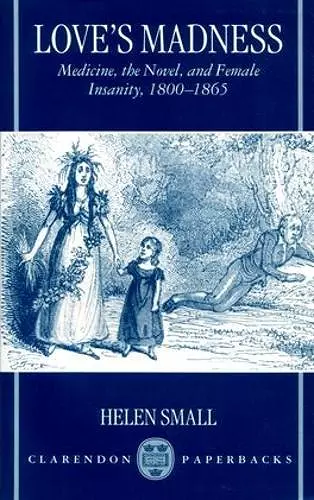Love's Madness
Medicine, the Novel, and Female Insanity, 1800-1865
Format:Paperback
Publisher:Oxford University Press
Published:1st Oct '98
Currently unavailable, and unfortunately no date known when it will be back

Love's Madness makes an important new contribution to the interdisciplinary study of insanity. Focusing on the figure of the love-mad woman, Helen Small presents a significant reassessment of the ways in which British medical writers and novelists of the nineteenth century thought about madness, about femininity, and about narrative convention. At the centre of the book are studies of novels by Jane Austen, Sir Walter Scott, Charlotte Brontë, Wilkie Collins, and Charles Dickens, but Small also brings out the historical and literary interest of hitherto neglected writings by Charles Maturin, Lady Caroline Lamb, Edward Bulwer-Lytton, and others. Stories about women who go mad when they lose their lovers were extraordinarily popular during the late eighteenth and early nineteenth centuries, attracting novelists, poets, dramatists, musicians, painters, and sculptors. The representative figure of madness ceased to be the madman in chains and became instead the woman whose insanity was an extension of her female condition. Love's Madness traces the fortunes of love-mad women in fiction and in medicine between about 1800 and 1865. In literary terms, these dates demarcate the period between the decline of sentimentalism and the emergence of sensation fiction. In medical terms, they mark out a key stage in the history of insanity, beginning with major reform initiatives and ending with the establishment in 1865 of the Medico-Psychological Association. This original and highly readable study challenges previous assumptions about the relationship between medicine and the novel. A major addition to nineteenth-century studies, it will be of interest to students and scholars of literature, feminism, social history, and the history of medicine.
The love-mad woman is herself a convention, and the fascination of this study by Helen Small is its exploration of the variety of concerns for which the convention acts as a vehicle. Small does a good job in explaining the dubiety and sensationalism of circumstances which were such that it is not surprising to find so many fiction writers figuring madness in their work. Helen Small not only recounts its history but brings it to life. * Valerie Pedlar - Journal of Victorian Culture Spring 99 *
A thorough book. As a work of research, Small's study is to be highly recommended. * John Maynard - Modern Philology. *
ISBN: 9780198184911
Dimensions: 216mm x 136mm x 16mm
Weight: 347g
276 pages